The Best 10 Alternatives to Silver Sky (+ Pricing & Reviews)
Twingate Team
•
Jul 27, 2024

SilverSky provides a comprehensive suite of cybersecurity services, including Managed Detection and Response, email protection, and security consulting. While their offerings are robust, they may not be the right fit for every organization. This article explores how SilverSky's services align with the needs of distributed workforces under a zero trust networking model.
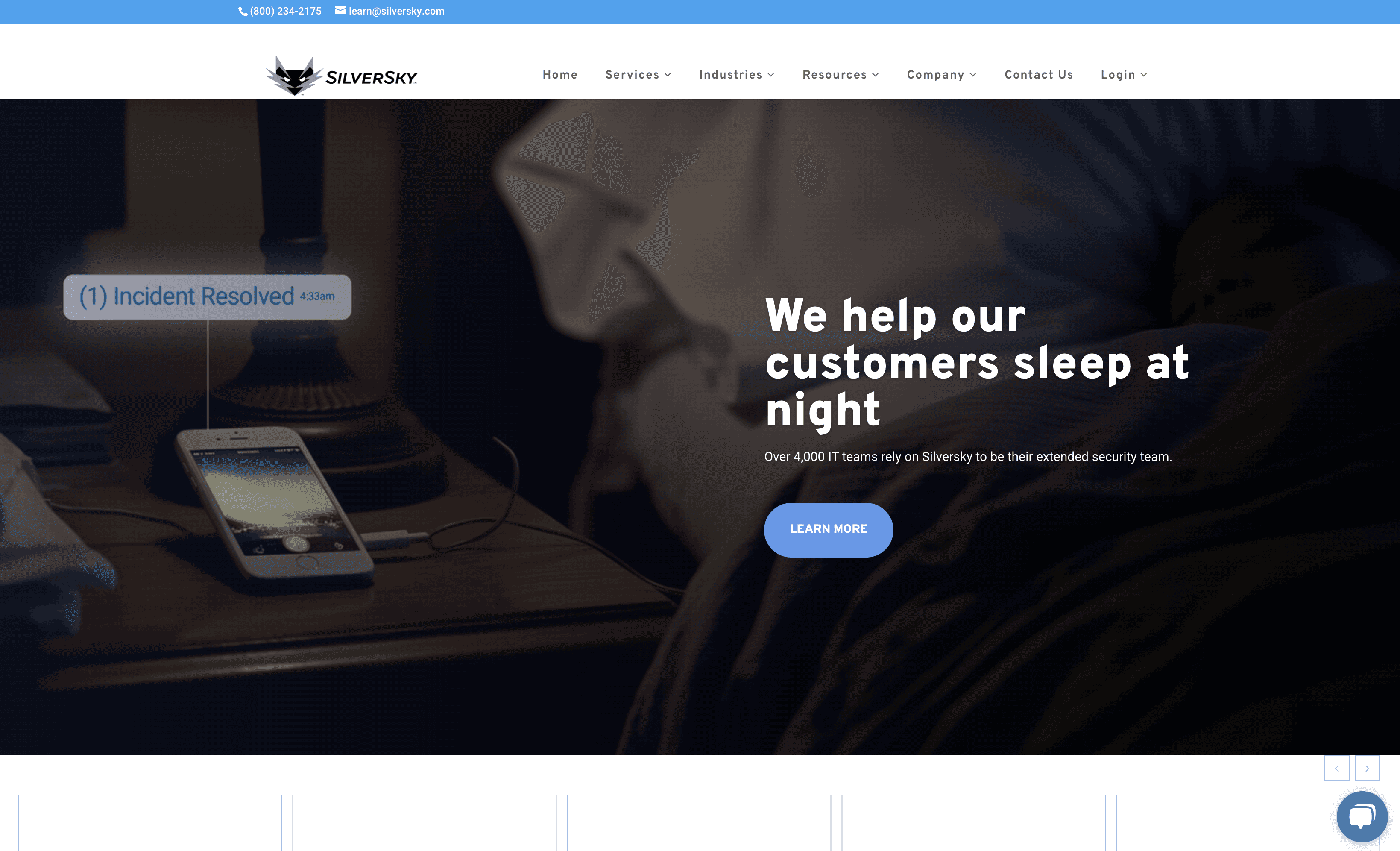
10 Alternatives to Silver Sky
1. Sysdig
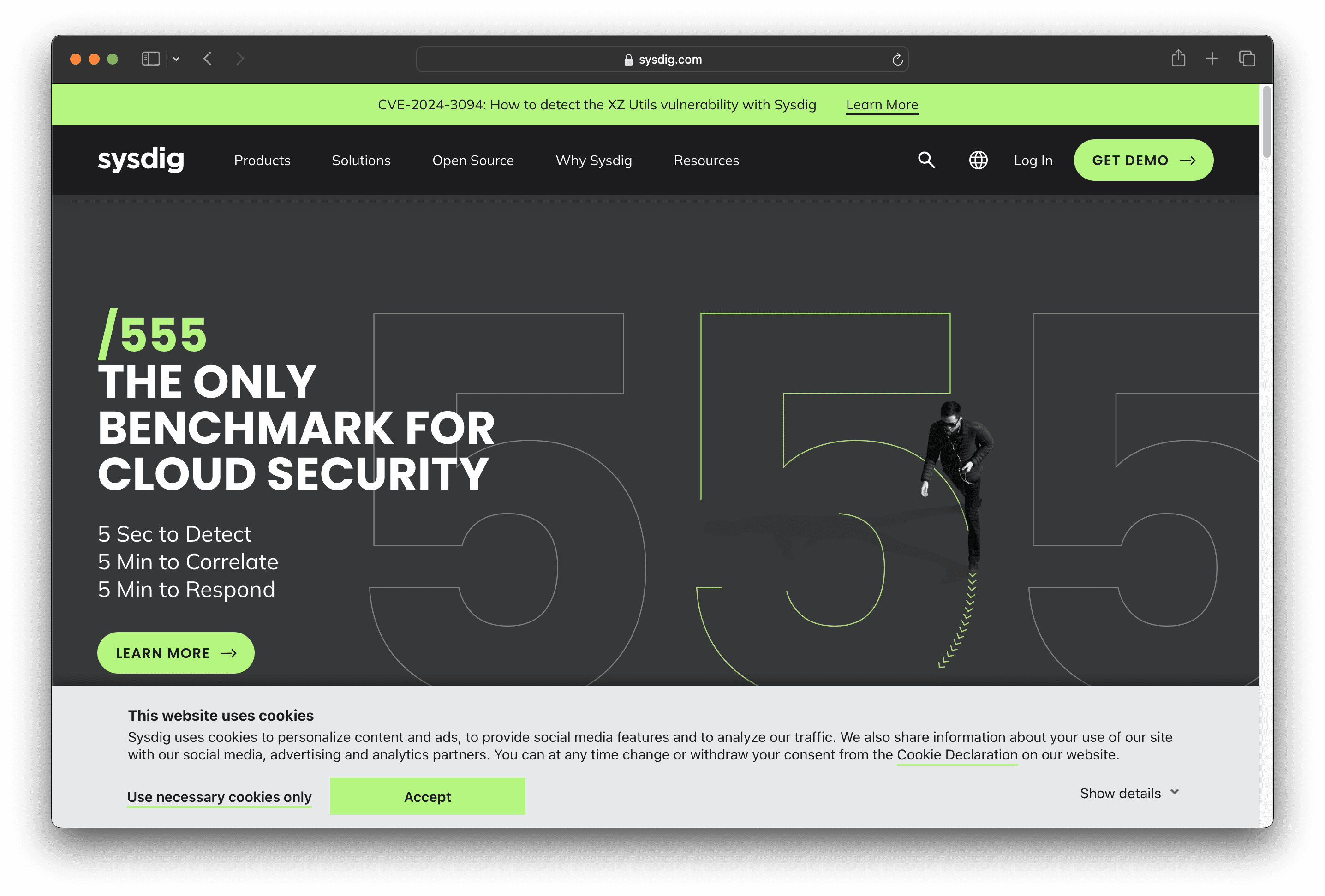
Sysdig is a security solution designed for cloud-native environments, including containers and Kubernetes. It offers real-time visibility and security, helping organizations detect and respond to threats quickly. With features like vulnerability management and cloud detection and response, Sysdig aims to simplify and enhance cloud security for businesses of all sizes.
Sysdig Pricing
Cloud-Native Application Protection Platform (CNAPP)
Detection and Response
Sysdig's pricing is not public. Contact their support for more info.
Sysdig Reviews
Sysdig has an overall rating of 4.8 out of 5 stars based on 77 reviews. Users praise its real-time threat detection and comprehensive visibility. Check out more of our reviews here!
Pros and Cons of Sysdig
Pros:
Real-time security: Sysdig offers near real-time alerting and mean-time-to-detect capabilities, ensuring swift responses to threats.
Comprehensive detection: The platform provides a complete CNAPP that prioritizes vulnerabilities, misconfigurations, permissions, and threats.
Customer satisfaction: An impressive 97% of customers are willing to recommend Sysdig, highlighting its effectiveness and reliability.
Cons:
Alert fatigue: Despite efforts to reduce alert fatigue, managing the volume of alerts can still be challenging for some users.
Complexity: Initial setup and configuration can be complex, requiring autotuning to focus on the most pressing issues.
Feature limitations: Some users have noted limitations in certain features, indicating room for improvement in the platform's capabilities.
2. ManageEngine Desktop Central
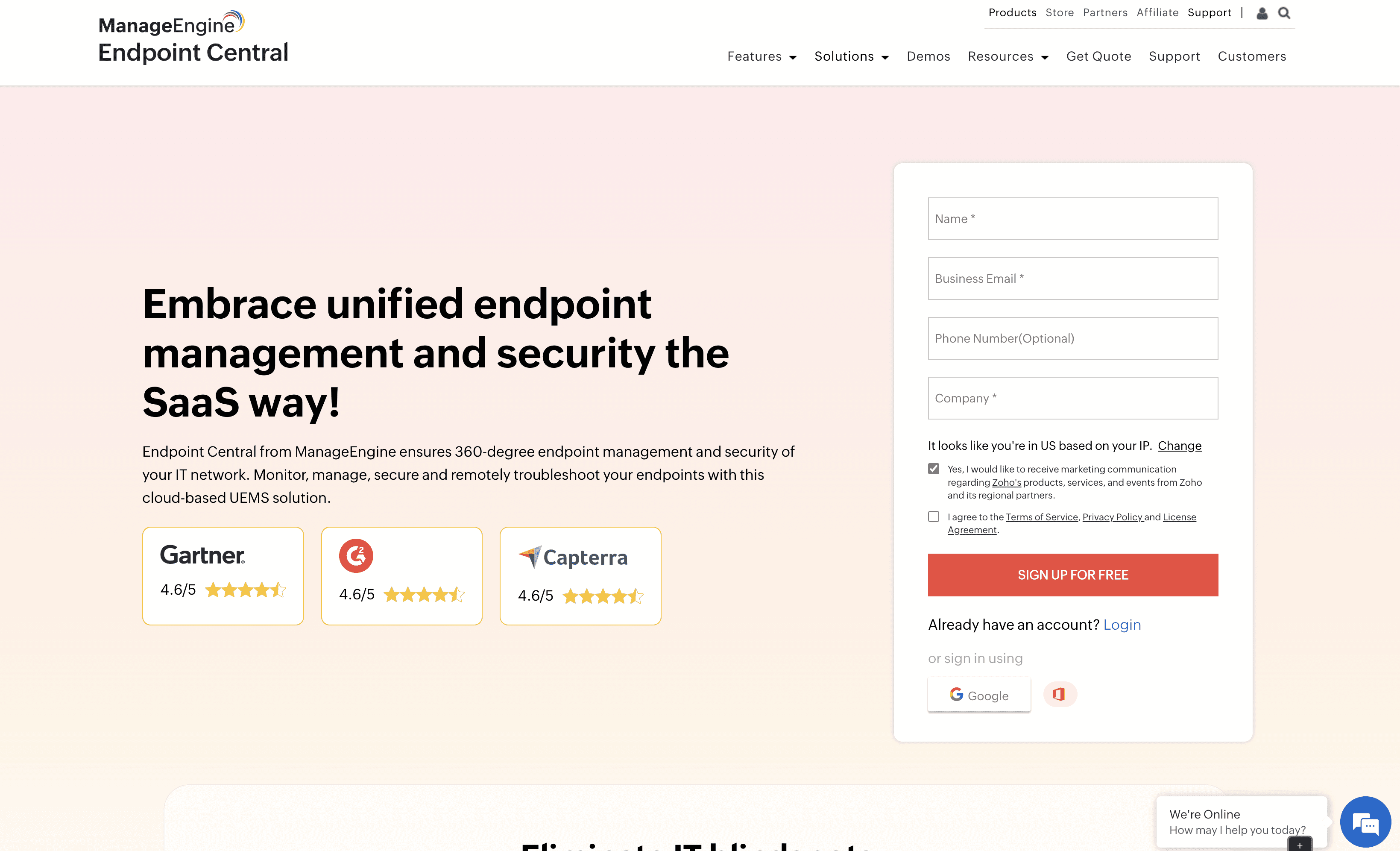
ManageEngine Desktop Central is a cloud-based unified endpoint management and security solution. It allows IT administrators to monitor, manage, secure, and troubleshoot endpoints like desktops, laptops, and mobile devices from a single console. Designed for ease of use, it simplifies complex tasks and enhances endpoint security.
ManageEngine Desktop Central Pricing
ManageEngine Desktop Central's pricing is not public. Contact their support for more info.
ManageEngine Desktop Central Reviews
ManageEngine Desktop Central has an overall rating of 4.2 out of 5 stars based on 20 reviews. Users appreciate its wide range of features and intuitive interface. Check out more of our reviews here!
Pros and Cons ofManageEngine Desktop Central
Pros:
Comprehensive management: Offers 360-degree endpoint management and security, covering all bases.
Ease of use: Intuitive interface simplifies complex tasks, making it accessible for all skill levels.
Automated patch management: Supports Windows, Mac, Linux OSs, and 850+ third-party applications.
Cons:
Lack of customization: Limited options for tailoring the software to specific needs.
Connection issues: Users report occasional connectivity problems, affecting remote management.
Learning curve: Initial setup and configuration can be challenging for new users.
3. Stream Security
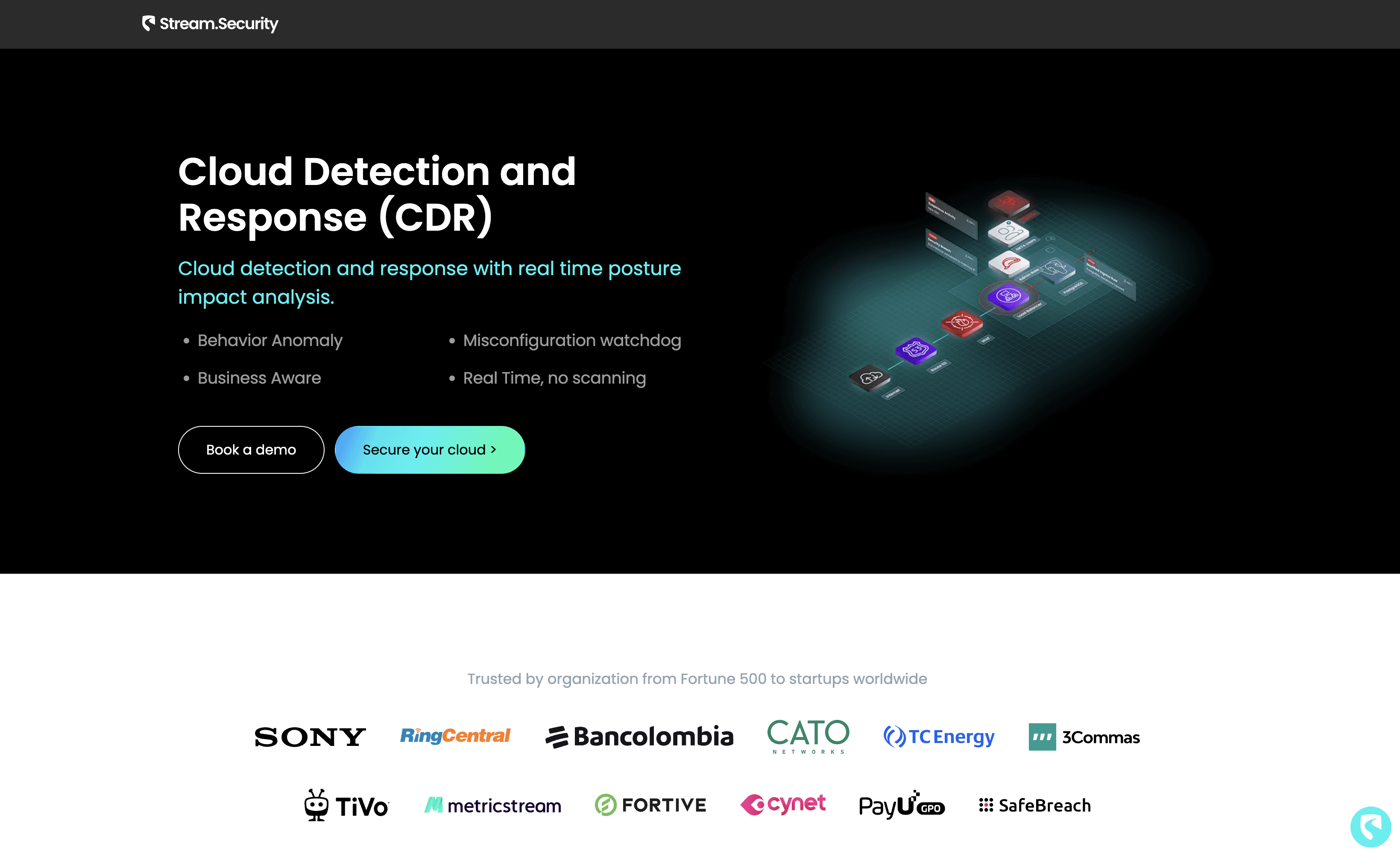
Stream Security is a cloud detection and response solution designed to provide real-time threat detection and posture analysis. It offers customizable alerts, compliance validation, and easy integration with existing workflows, making it a versatile tool for businesses of all sizes seeking robust cloud security.
Stream Security Pricing
Stream Security's pricing is not public. Contact their support for more info.
Stream Security Reviews
Stream Security has an overall rating of 0 out of 5 stars based on 0 reviews. Users have not provided enough feedback. Check out more of our reviews here!
Pros and Cons of Stream Security
Pros:
Real-time detection: Immediate visibility and actionable insights to prioritize exposures and threats.
Customization: No-code guardrail customizations to fit specific business needs.
Comprehensive investigations: Detailed root cause analysis and event chain tracing.
Cons:
Limited reviews: Not enough user feedback to provide comprehensive buying insights.
Security information: Seller has not added their security information yet, which might be a concern.
Learning curve: Initial setup and configuration can be challenging for new users.
4. ESET PROTECT Complete
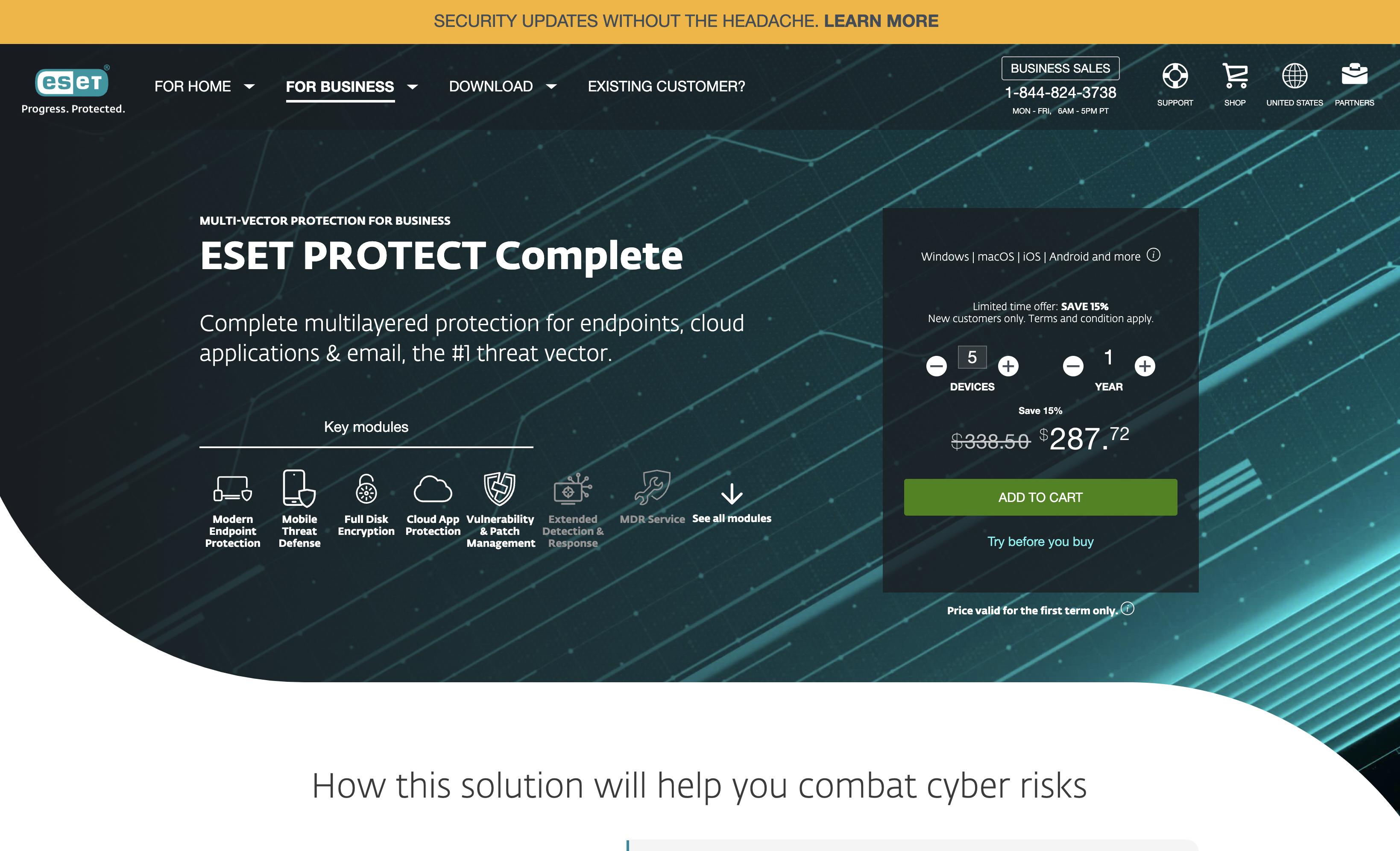
ESET PROTECT Complete is a cybersecurity solution offering advanced endpoint protection, mobile threat defense, and full disk encryption. It integrates seamlessly with existing infrastructure, providing comprehensive security for businesses of all sizes. With easy deployment and management, it ensures robust protection against modern threats.
ESET PROTECT Complete Pricing
Discounted Price: $287.72 (after a 15% discount from the original price of $338.50).
ESET PROTECT Complete Reviews
ESET PROTECT Complete has an overall rating of 4.7 out of 5 stars based on 45 reviews. Users praise its robust endpoint protection and seamless integration. Check out more of our reviews here!
Pros and Cons of ESET PROTECT Complete
Pros:
Advanced Protection: Comprehensive security for endpoints, cloud apps, and email, covering primary threat vectors.
Multi-Layered Security: Utilizes advanced technology to secure computers, mobiles, and file servers.
Easy Management: Unified platform interface for superior network visibility and control, available as cloud or on-prem deployment.
Cons:
Price Validity: Promotional price valid only for the first term; renewals may be higher.
Complexity for Small Businesses: Extensive features might overwhelm small businesses with limited IT resources.
Additional Costs: Advanced features like Extended Detection & Response are add-ons, increasing overall cost.
5. Rubrik
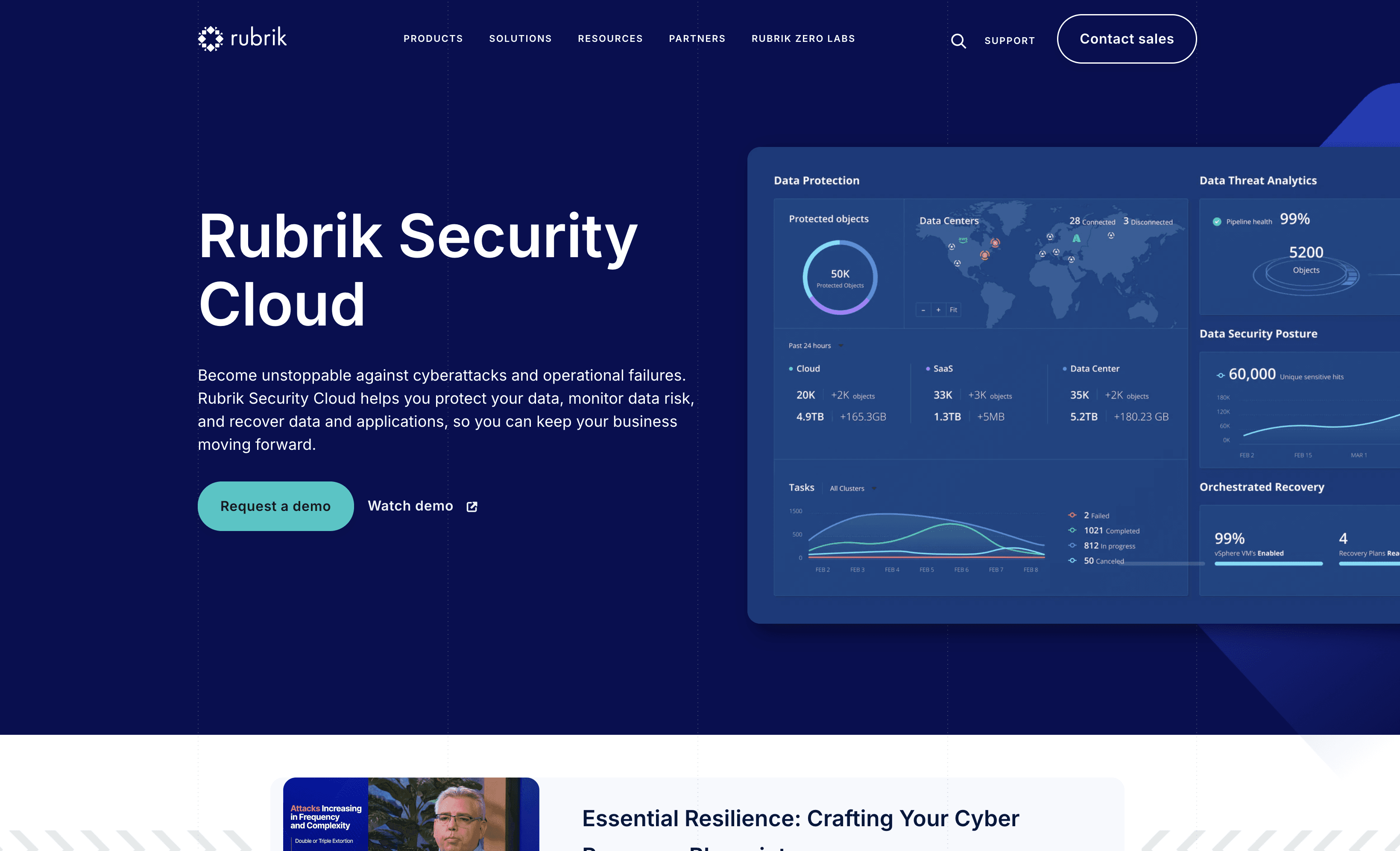
Rubrik is a data security solution designed to protect, monitor, and recover data across enterprise, cloud, and SaaS environments. It offers features like data protection, threat analytics, and cyber recovery, ensuring business continuity and resilience against cyberattacks and operational failures.
Rubrik Pricing
Rubrik's pricing is not public. Contact their support for more info.
Rubrik Reviews
Rubrik has an overall rating of 4.6 out of 5 stars based on 91 reviews. Users appreciate its user-friendly interface and robust backup capabilities. Check out more of our reviews here!
Pros and Cons of Rubrik
Pros:
Comprehensive Data Protection: Secure backups with air-gapped, immutable, and access-controlled features ensure data integrity.
Zero Trust Architecture: Built using Zero Trust principles to prevent threats at the data layer, enhancing security.
Global Policy Driven Automation: Ensures data availability, policy compliance, and orchestrates recovery workflows efficiently.
Cons:
Expensive: High costs can be a barrier for small to medium-sized businesses.
Complexity: Initial setup and configuration can be challenging, requiring specialized knowledge.
Restore Issues: Some users report difficulties with the data restoration process, impacting reliability.
6. Forcepoint ONE
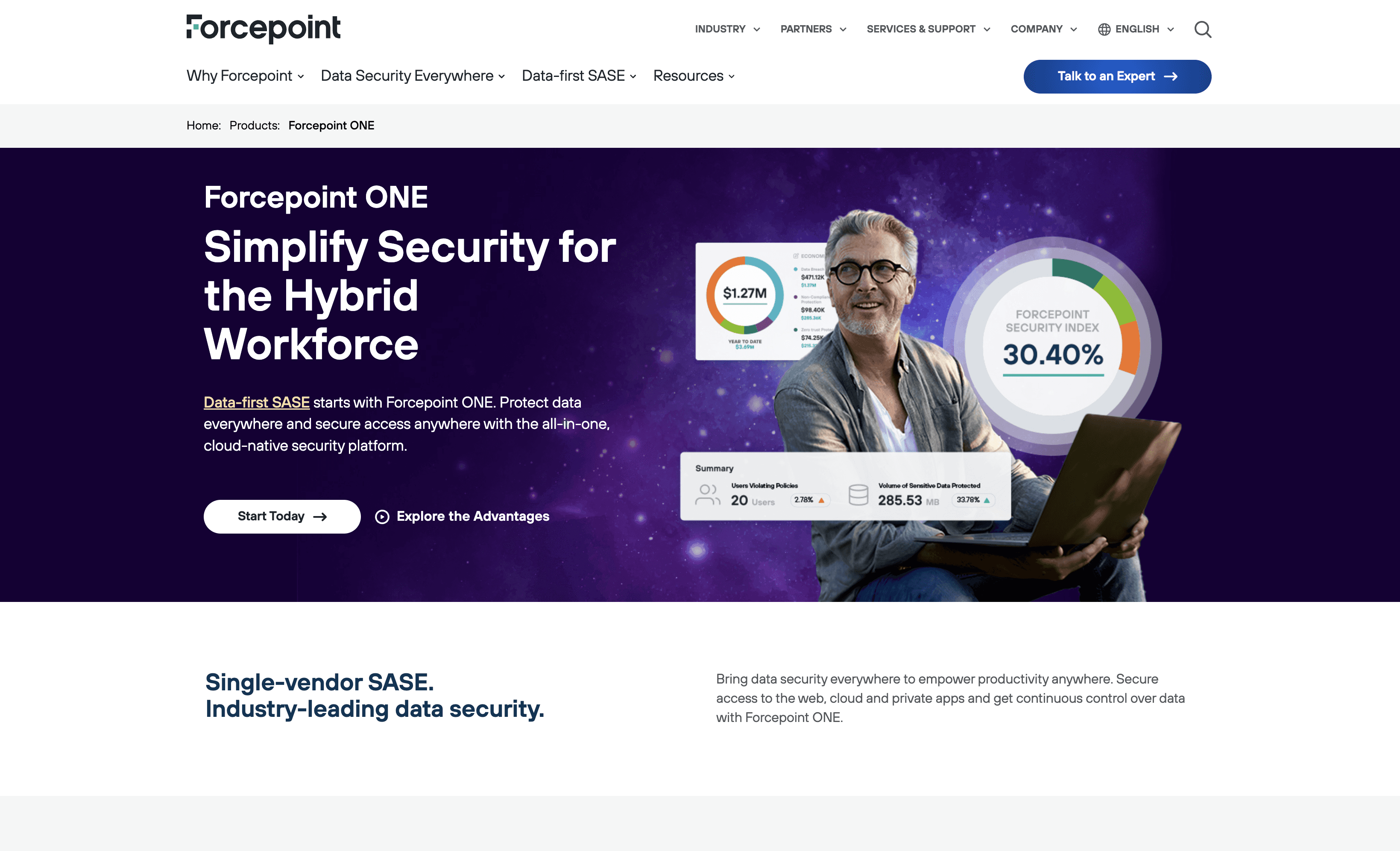
Forcepoint ONE is a cloud-native security platform designed to simplify security for hybrid workforces. It offers comprehensive protection for data and secure access from anywhere, leveraging a single-vendor SASE approach. With features like CASB, ZTNA, and web security, it modernizes and consolidates security infrastructure.
Forcepoint ONE Pricing
Forcepoint ONE's pricing is not public. Contact their support for more info.
Forcepoint ONE Reviews
Forcepoint ONE has an overall rating of 4.2 out of 5 stars based on 21 reviews. Users appreciate its ease of use and comprehensive features. Check out more of our reviews here!
Pros and Cons of Forcepoint ONE
Pros:
Empower faster and safer work from anywhere: Users can work securely from any location with CASB, ZTNA, and Web Security, ensuring productivity while keeping data safe on any device.
Replace aging and disparate infrastructure: The platform offers a modern solution to replace outdated and fragmented security systems.
Adopt Zero Trust principles: Forcepoint ONE facilitates identity-based access control and Zero Trust web access, ensuring secure website visits and file downloads.
Cons:
Complexity in Deployment: While the platform offers extensive features, the initial setup and integration might be complex for some organizations.
Cost: The comprehensive nature of the platform and its advanced features might come at a higher cost, which could be a consideration for smaller organizations.
Learning Curve: Adopting new security principles like Zero Trust and integrating various security services might require significant training and adjustment for existing IT teams.
7. Proofpoint
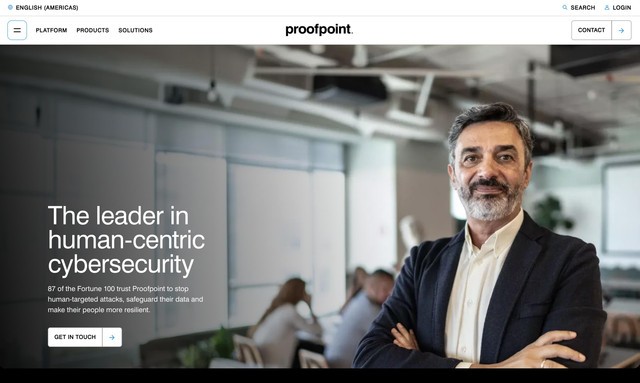
Proofpoint is a cybersecurity solution focused on protecting people, data, and brands from advanced threats and compliance risks. It offers a human-centric approach, integrating seamlessly with existing infrastructure to provide comprehensive security for businesses of all sizes. Proofpoint aims to simplify and enhance cybersecurity through innovative solutions.
Proofpoint Pricing
Proofpoint's pricing is not public. Contact their support for more info.
Proofpoint Reviews
Proofpoint has an overall rating of 4.6 out of 5 stars based on 498 reviews. Users say, "Proofpoint is make out email business focused and secure." Check out more of our reviews here!
Pros and Cons of Proofpoint
Pros:
Human-Centric Approach: Focuses on protecting people, offering a modern and effective cybersecurity strategy.
Comprehensive Solutions: Wide range of products covering threat defense, information protection, and security awareness.
Industry Recognition: Trusted by 87 of the Fortune 100 companies, highlighting its reliability and effectiveness.
Cons:
Complexity: The extensive range of products can be overwhelming for smaller organizations.
Cost: High-end solutions may be expensive, limiting accessibility for small to medium-sized businesses.
Implementation: Requires significant changes in existing IT infrastructure, posing challenges for some organizations.
8. Orca Security
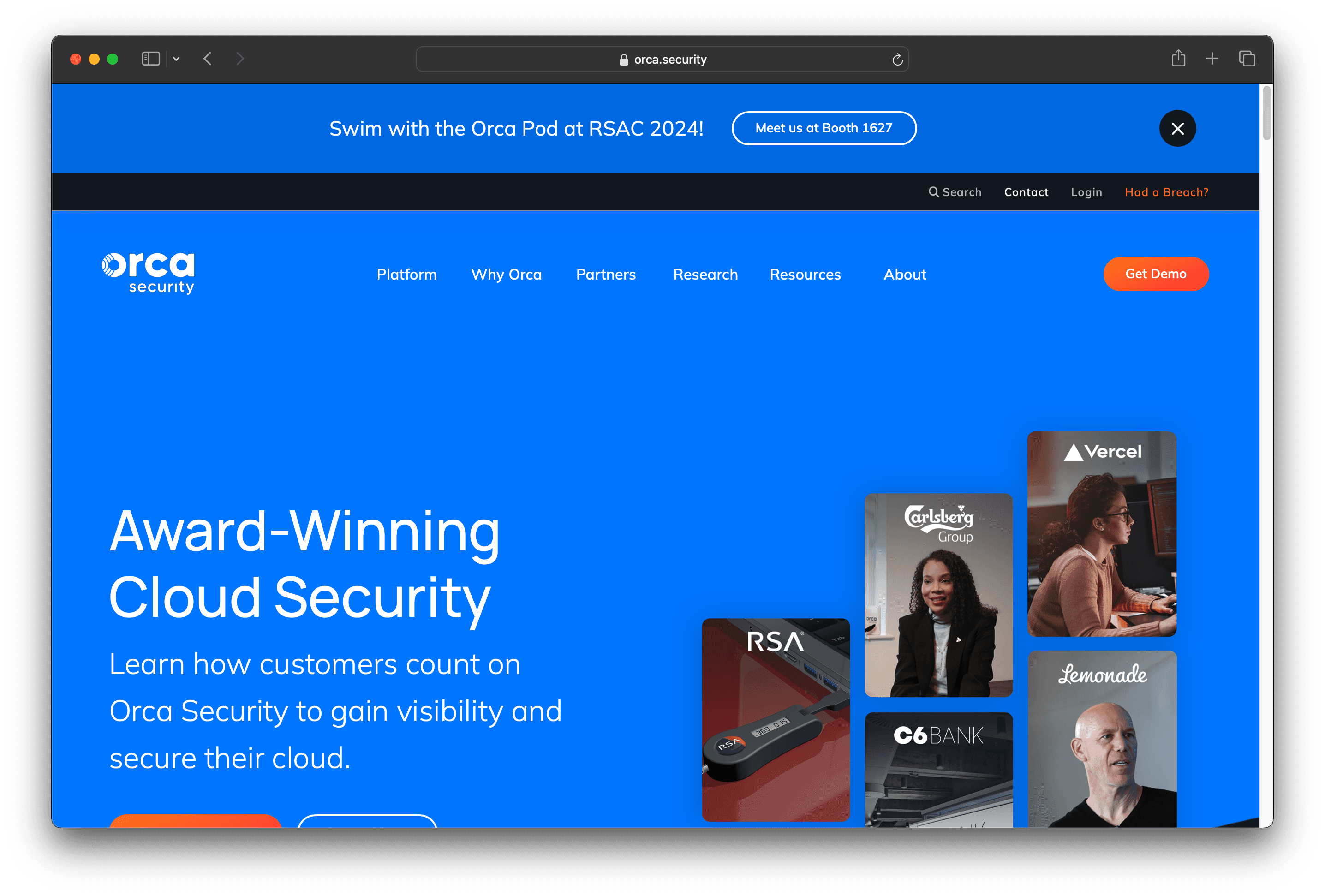
Orca Security is a cloud security platform offering comprehensive protection for cloud-native applications. It features agentless scanning, real-time threat detection, and multi-cloud compliance. Designed for ease of use, it provides instant visibility and security across cloud environments, making it ideal for businesses of all sizes.
Orca Security Pricing
Orca Security's pricing is not public. Contact their support for more info.
Orca Security Reviews
Orca Security has an overall rating of 4.6 out of 5 stars based on 167 reviews. Users appreciate its ease of configuration and excellent support. Check out more of our reviews here!
Pros and Cons of Orca Security
Pros:
Agentless Cloud Security: Orca's patented SideScanning technology eliminates the need for agents, reducing gaps in coverage and operational costs.
Easy Onboarding: Quick and efficient onboarding process that automatically detects and monitors new cloud assets.
Comprehensive Coverage: Full-stack visibility and coverage for all cloud assets, including VMs, containers, storage buckets, databases, and serverless applications.
Cons:
Complexity for Small Teams: The comprehensive nature of the platform might be overwhelming for smaller teams or organizations with limited security expertise.
Cost: Advanced features and comprehensive coverage might come at a higher cost, which could be a consideration for budget-conscious organizations.
Learning Curve: Despite easy onboarding, fully leveraging all features and capabilities might require a learning curve and training for the security team.
9. OPSWAT Security Score
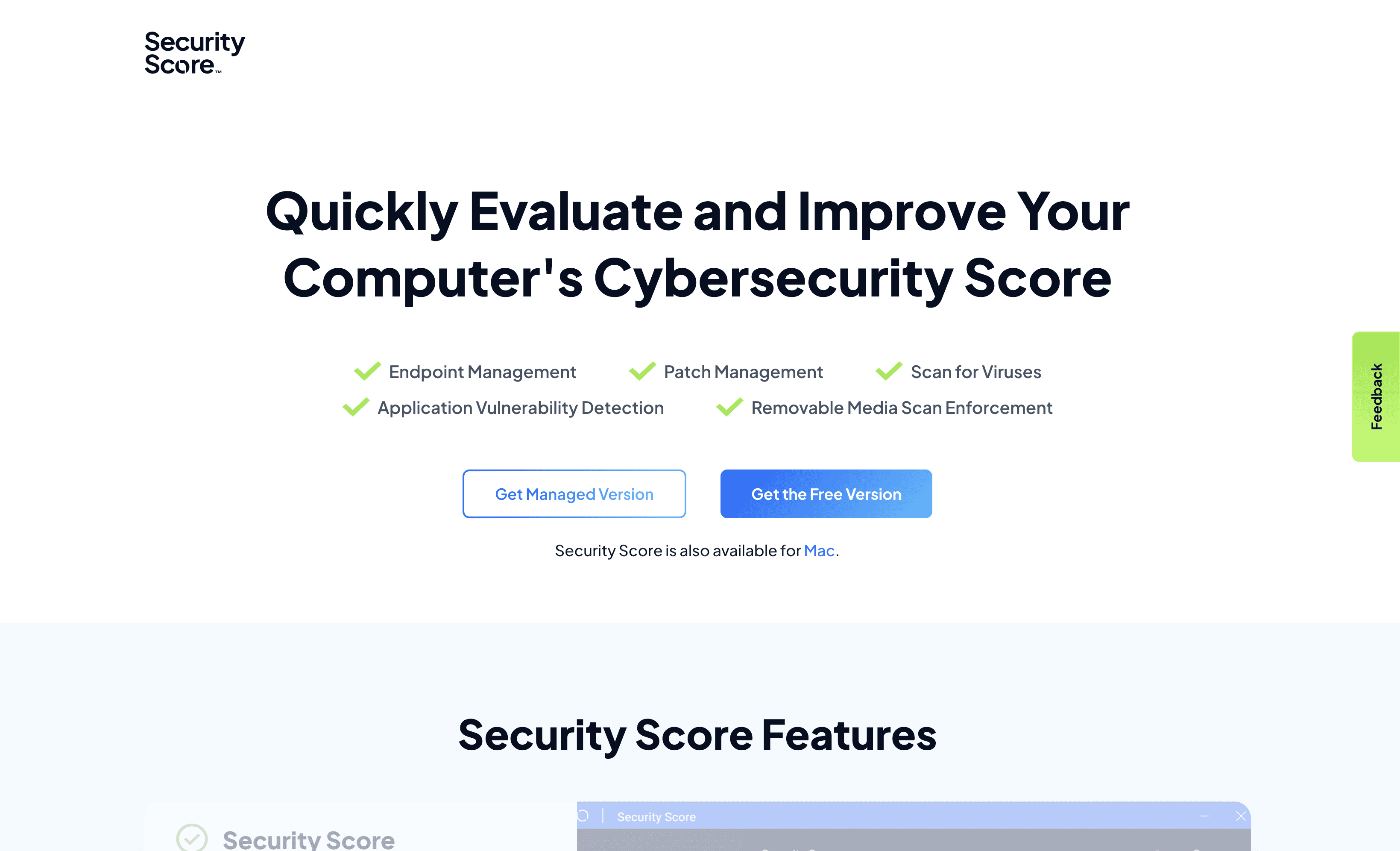
OPSWAT Security Score is a tool designed to evaluate and improve the cybersecurity posture of computers. It assesses various factors like endpoint management, patch management, and virus scanning to provide a comprehensive security score. The tool aims to protect against external threats and ensure systems are up to date.
OPSWAT Security Score Pricing
OPSWAT Security Score's pricing is not public. Contact their support for more info.
OPSWAT Security Score Reviews
OPSWAT Security Score has an overall rating of 0 out of 5 stars based on 0 reviews. Users have not provided enough feedback. Check out more of our reviews here!
Pros and Cons of OPSWAT Security Score
Pros:
Comprehensive Cyber Risk Scoring: Evaluates cyber-risk based on OS updates, vulnerable applications, firewall, and malware protection.
Free to Use: Users can check their security score and fix security issues without any cost.
No Installation Required: The app can be downloaded and run without the need for installation.
Cons:
Limited Features for Unclaimed Profiles: The profile has limited features unless claimed and upgraded by the company.
Lack of Security Information: The seller has not added their security information yet, requiring users to request it.
Not Enough Reviews: Insufficient reviews on G2 to provide comprehensive buying insights.
10. Trend Micro
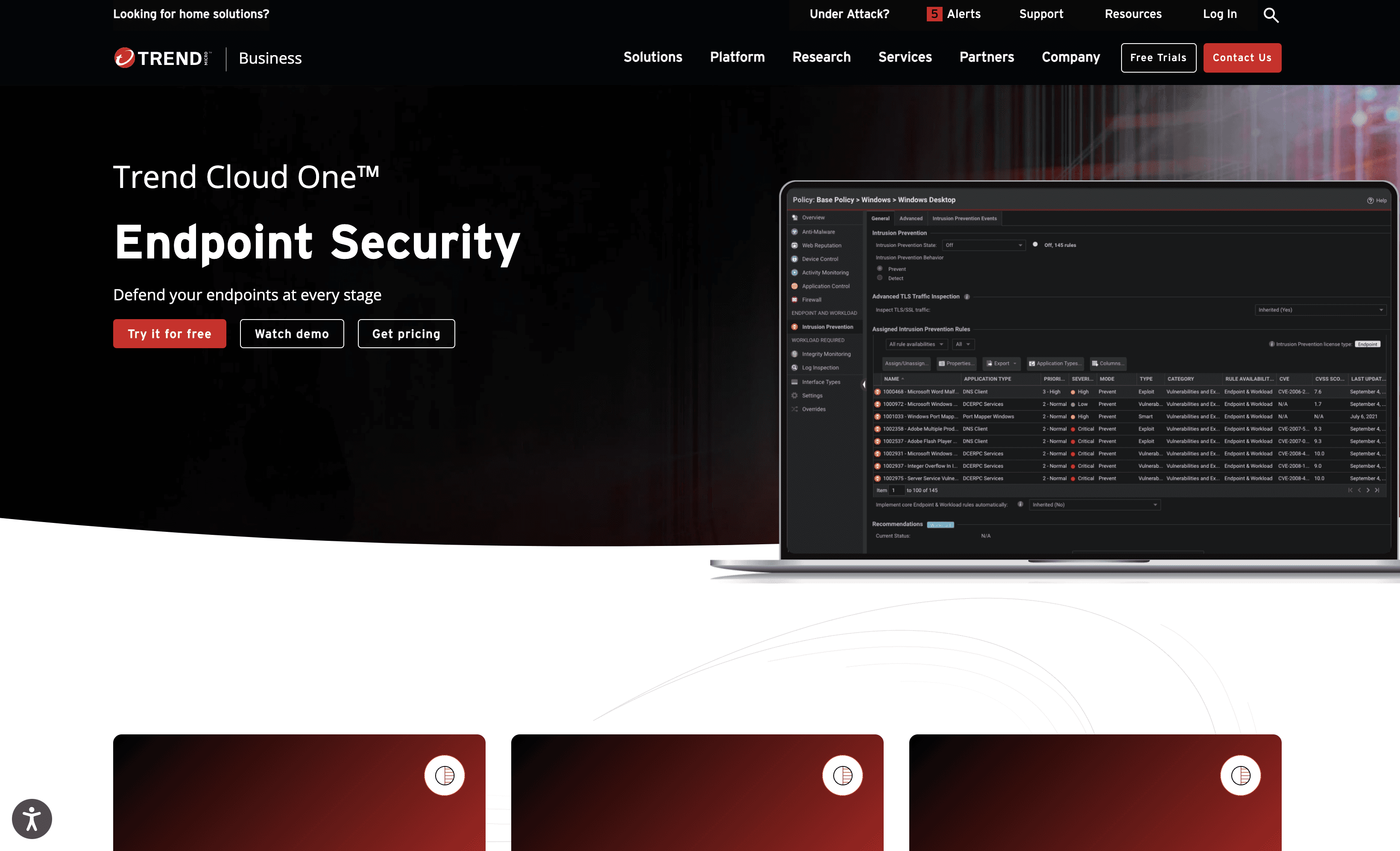
Trend Micro is a cybersecurity solution offering comprehensive endpoint protection. It integrates seamlessly with existing infrastructure, providing advanced threat detection and response. Designed for ease of use and high performance, Trend Micro aims to secure businesses of all sizes against modern cyber threats.
Trend Micro Pricing
Trend Micro's pricing is not public. Contact their support for more info.
Trend Micro Reviews
Trend Micro has an overall rating of 4.2 out of 5 stars based on 34 reviews. Users appreciate its ease of implementation and customer support. Check out more of our reviews here!
Pros and Cons of Trend Micro
Pros:
Comprehensive Security: Offers a full range of advanced endpoint security capabilities in a single SaaS solution.
Unified Management: Provides unified visibility and management across services, simplifying security operations.
Broad Threat Protection: Smart, layered security maximizes prevention, detection, and response to threats.
Cons:
Slow Performance: Some users report that the software can slow down system performance, impacting productivity.
Complexity for Small Teams: The extensive features might be overwhelming for smaller teams with limited security expertise.
Cost: Advanced features and comprehensive coverage might come at a higher cost, which could be a consideration for budget-conscious organizations.
Looking to secure your technical infrastructure?
Twingate offers granular access controls and deployment automations to protect your VPC environment. By leveraging Zero Trust security tools, Twingate ensures that private resources and internet traffic remain secure in the modern work landscape. Try Twingate for Free today!
Rapidly implement a modern Zero Trust network that is more secure and maintainable than VPNs.
The Best 10 Alternatives to Silver Sky (+ Pricing & Reviews)
Twingate Team
•
Jul 27, 2024

SilverSky provides a comprehensive suite of cybersecurity services, including Managed Detection and Response, email protection, and security consulting. While their offerings are robust, they may not be the right fit for every organization. This article explores how SilverSky's services align with the needs of distributed workforces under a zero trust networking model.

10 Alternatives to Silver Sky
1. Sysdig

Sysdig is a security solution designed for cloud-native environments, including containers and Kubernetes. It offers real-time visibility and security, helping organizations detect and respond to threats quickly. With features like vulnerability management and cloud detection and response, Sysdig aims to simplify and enhance cloud security for businesses of all sizes.
Sysdig Pricing
Cloud-Native Application Protection Platform (CNAPP)
Detection and Response
Sysdig's pricing is not public. Contact their support for more info.
Sysdig Reviews
Sysdig has an overall rating of 4.8 out of 5 stars based on 77 reviews. Users praise its real-time threat detection and comprehensive visibility. Check out more of our reviews here!
Pros and Cons of Sysdig
Pros:
Real-time security: Sysdig offers near real-time alerting and mean-time-to-detect capabilities, ensuring swift responses to threats.
Comprehensive detection: The platform provides a complete CNAPP that prioritizes vulnerabilities, misconfigurations, permissions, and threats.
Customer satisfaction: An impressive 97% of customers are willing to recommend Sysdig, highlighting its effectiveness and reliability.
Cons:
Alert fatigue: Despite efforts to reduce alert fatigue, managing the volume of alerts can still be challenging for some users.
Complexity: Initial setup and configuration can be complex, requiring autotuning to focus on the most pressing issues.
Feature limitations: Some users have noted limitations in certain features, indicating room for improvement in the platform's capabilities.
2. ManageEngine Desktop Central

ManageEngine Desktop Central is a cloud-based unified endpoint management and security solution. It allows IT administrators to monitor, manage, secure, and troubleshoot endpoints like desktops, laptops, and mobile devices from a single console. Designed for ease of use, it simplifies complex tasks and enhances endpoint security.
ManageEngine Desktop Central Pricing
ManageEngine Desktop Central's pricing is not public. Contact their support for more info.
ManageEngine Desktop Central Reviews
ManageEngine Desktop Central has an overall rating of 4.2 out of 5 stars based on 20 reviews. Users appreciate its wide range of features and intuitive interface. Check out more of our reviews here!
Pros and Cons ofManageEngine Desktop Central
Pros:
Comprehensive management: Offers 360-degree endpoint management and security, covering all bases.
Ease of use: Intuitive interface simplifies complex tasks, making it accessible for all skill levels.
Automated patch management: Supports Windows, Mac, Linux OSs, and 850+ third-party applications.
Cons:
Lack of customization: Limited options for tailoring the software to specific needs.
Connection issues: Users report occasional connectivity problems, affecting remote management.
Learning curve: Initial setup and configuration can be challenging for new users.
3. Stream Security

Stream Security is a cloud detection and response solution designed to provide real-time threat detection and posture analysis. It offers customizable alerts, compliance validation, and easy integration with existing workflows, making it a versatile tool for businesses of all sizes seeking robust cloud security.
Stream Security Pricing
Stream Security's pricing is not public. Contact their support for more info.
Stream Security Reviews
Stream Security has an overall rating of 0 out of 5 stars based on 0 reviews. Users have not provided enough feedback. Check out more of our reviews here!
Pros and Cons of Stream Security
Pros:
Real-time detection: Immediate visibility and actionable insights to prioritize exposures and threats.
Customization: No-code guardrail customizations to fit specific business needs.
Comprehensive investigations: Detailed root cause analysis and event chain tracing.
Cons:
Limited reviews: Not enough user feedback to provide comprehensive buying insights.
Security information: Seller has not added their security information yet, which might be a concern.
Learning curve: Initial setup and configuration can be challenging for new users.
4. ESET PROTECT Complete

ESET PROTECT Complete is a cybersecurity solution offering advanced endpoint protection, mobile threat defense, and full disk encryption. It integrates seamlessly with existing infrastructure, providing comprehensive security for businesses of all sizes. With easy deployment and management, it ensures robust protection against modern threats.
ESET PROTECT Complete Pricing
Discounted Price: $287.72 (after a 15% discount from the original price of $338.50).
ESET PROTECT Complete Reviews
ESET PROTECT Complete has an overall rating of 4.7 out of 5 stars based on 45 reviews. Users praise its robust endpoint protection and seamless integration. Check out more of our reviews here!
Pros and Cons of ESET PROTECT Complete
Pros:
Advanced Protection: Comprehensive security for endpoints, cloud apps, and email, covering primary threat vectors.
Multi-Layered Security: Utilizes advanced technology to secure computers, mobiles, and file servers.
Easy Management: Unified platform interface for superior network visibility and control, available as cloud or on-prem deployment.
Cons:
Price Validity: Promotional price valid only for the first term; renewals may be higher.
Complexity for Small Businesses: Extensive features might overwhelm small businesses with limited IT resources.
Additional Costs: Advanced features like Extended Detection & Response are add-ons, increasing overall cost.
5. Rubrik

Rubrik is a data security solution designed to protect, monitor, and recover data across enterprise, cloud, and SaaS environments. It offers features like data protection, threat analytics, and cyber recovery, ensuring business continuity and resilience against cyberattacks and operational failures.
Rubrik Pricing
Rubrik's pricing is not public. Contact their support for more info.
Rubrik Reviews
Rubrik has an overall rating of 4.6 out of 5 stars based on 91 reviews. Users appreciate its user-friendly interface and robust backup capabilities. Check out more of our reviews here!
Pros and Cons of Rubrik
Pros:
Comprehensive Data Protection: Secure backups with air-gapped, immutable, and access-controlled features ensure data integrity.
Zero Trust Architecture: Built using Zero Trust principles to prevent threats at the data layer, enhancing security.
Global Policy Driven Automation: Ensures data availability, policy compliance, and orchestrates recovery workflows efficiently.
Cons:
Expensive: High costs can be a barrier for small to medium-sized businesses.
Complexity: Initial setup and configuration can be challenging, requiring specialized knowledge.
Restore Issues: Some users report difficulties with the data restoration process, impacting reliability.
6. Forcepoint ONE

Forcepoint ONE is a cloud-native security platform designed to simplify security for hybrid workforces. It offers comprehensive protection for data and secure access from anywhere, leveraging a single-vendor SASE approach. With features like CASB, ZTNA, and web security, it modernizes and consolidates security infrastructure.
Forcepoint ONE Pricing
Forcepoint ONE's pricing is not public. Contact their support for more info.
Forcepoint ONE Reviews
Forcepoint ONE has an overall rating of 4.2 out of 5 stars based on 21 reviews. Users appreciate its ease of use and comprehensive features. Check out more of our reviews here!
Pros and Cons of Forcepoint ONE
Pros:
Empower faster and safer work from anywhere: Users can work securely from any location with CASB, ZTNA, and Web Security, ensuring productivity while keeping data safe on any device.
Replace aging and disparate infrastructure: The platform offers a modern solution to replace outdated and fragmented security systems.
Adopt Zero Trust principles: Forcepoint ONE facilitates identity-based access control and Zero Trust web access, ensuring secure website visits and file downloads.
Cons:
Complexity in Deployment: While the platform offers extensive features, the initial setup and integration might be complex for some organizations.
Cost: The comprehensive nature of the platform and its advanced features might come at a higher cost, which could be a consideration for smaller organizations.
Learning Curve: Adopting new security principles like Zero Trust and integrating various security services might require significant training and adjustment for existing IT teams.
7. Proofpoint

Proofpoint is a cybersecurity solution focused on protecting people, data, and brands from advanced threats and compliance risks. It offers a human-centric approach, integrating seamlessly with existing infrastructure to provide comprehensive security for businesses of all sizes. Proofpoint aims to simplify and enhance cybersecurity through innovative solutions.
Proofpoint Pricing
Proofpoint's pricing is not public. Contact their support for more info.
Proofpoint Reviews
Proofpoint has an overall rating of 4.6 out of 5 stars based on 498 reviews. Users say, "Proofpoint is make out email business focused and secure." Check out more of our reviews here!
Pros and Cons of Proofpoint
Pros:
Human-Centric Approach: Focuses on protecting people, offering a modern and effective cybersecurity strategy.
Comprehensive Solutions: Wide range of products covering threat defense, information protection, and security awareness.
Industry Recognition: Trusted by 87 of the Fortune 100 companies, highlighting its reliability and effectiveness.
Cons:
Complexity: The extensive range of products can be overwhelming for smaller organizations.
Cost: High-end solutions may be expensive, limiting accessibility for small to medium-sized businesses.
Implementation: Requires significant changes in existing IT infrastructure, posing challenges for some organizations.
8. Orca Security

Orca Security is a cloud security platform offering comprehensive protection for cloud-native applications. It features agentless scanning, real-time threat detection, and multi-cloud compliance. Designed for ease of use, it provides instant visibility and security across cloud environments, making it ideal for businesses of all sizes.
Orca Security Pricing
Orca Security's pricing is not public. Contact their support for more info.
Orca Security Reviews
Orca Security has an overall rating of 4.6 out of 5 stars based on 167 reviews. Users appreciate its ease of configuration and excellent support. Check out more of our reviews here!
Pros and Cons of Orca Security
Pros:
Agentless Cloud Security: Orca's patented SideScanning technology eliminates the need for agents, reducing gaps in coverage and operational costs.
Easy Onboarding: Quick and efficient onboarding process that automatically detects and monitors new cloud assets.
Comprehensive Coverage: Full-stack visibility and coverage for all cloud assets, including VMs, containers, storage buckets, databases, and serverless applications.
Cons:
Complexity for Small Teams: The comprehensive nature of the platform might be overwhelming for smaller teams or organizations with limited security expertise.
Cost: Advanced features and comprehensive coverage might come at a higher cost, which could be a consideration for budget-conscious organizations.
Learning Curve: Despite easy onboarding, fully leveraging all features and capabilities might require a learning curve and training for the security team.
9. OPSWAT Security Score

OPSWAT Security Score is a tool designed to evaluate and improve the cybersecurity posture of computers. It assesses various factors like endpoint management, patch management, and virus scanning to provide a comprehensive security score. The tool aims to protect against external threats and ensure systems are up to date.
OPSWAT Security Score Pricing
OPSWAT Security Score's pricing is not public. Contact their support for more info.
OPSWAT Security Score Reviews
OPSWAT Security Score has an overall rating of 0 out of 5 stars based on 0 reviews. Users have not provided enough feedback. Check out more of our reviews here!
Pros and Cons of OPSWAT Security Score
Pros:
Comprehensive Cyber Risk Scoring: Evaluates cyber-risk based on OS updates, vulnerable applications, firewall, and malware protection.
Free to Use: Users can check their security score and fix security issues without any cost.
No Installation Required: The app can be downloaded and run without the need for installation.
Cons:
Limited Features for Unclaimed Profiles: The profile has limited features unless claimed and upgraded by the company.
Lack of Security Information: The seller has not added their security information yet, requiring users to request it.
Not Enough Reviews: Insufficient reviews on G2 to provide comprehensive buying insights.
10. Trend Micro

Trend Micro is a cybersecurity solution offering comprehensive endpoint protection. It integrates seamlessly with existing infrastructure, providing advanced threat detection and response. Designed for ease of use and high performance, Trend Micro aims to secure businesses of all sizes against modern cyber threats.
Trend Micro Pricing
Trend Micro's pricing is not public. Contact their support for more info.
Trend Micro Reviews
Trend Micro has an overall rating of 4.2 out of 5 stars based on 34 reviews. Users appreciate its ease of implementation and customer support. Check out more of our reviews here!
Pros and Cons of Trend Micro
Pros:
Comprehensive Security: Offers a full range of advanced endpoint security capabilities in a single SaaS solution.
Unified Management: Provides unified visibility and management across services, simplifying security operations.
Broad Threat Protection: Smart, layered security maximizes prevention, detection, and response to threats.
Cons:
Slow Performance: Some users report that the software can slow down system performance, impacting productivity.
Complexity for Small Teams: The extensive features might be overwhelming for smaller teams with limited security expertise.
Cost: Advanced features and comprehensive coverage might come at a higher cost, which could be a consideration for budget-conscious organizations.
Looking to secure your technical infrastructure?
Twingate offers granular access controls and deployment automations to protect your VPC environment. By leveraging Zero Trust security tools, Twingate ensures that private resources and internet traffic remain secure in the modern work landscape. Try Twingate for Free today!
Rapidly implement a modern Zero Trust network that is more secure and maintainable than VPNs.
The Best 10 Alternatives to Silver Sky (+ Pricing & Reviews)
Twingate Team
•
Jul 27, 2024

SilverSky provides a comprehensive suite of cybersecurity services, including Managed Detection and Response, email protection, and security consulting. While their offerings are robust, they may not be the right fit for every organization. This article explores how SilverSky's services align with the needs of distributed workforces under a zero trust networking model.

10 Alternatives to Silver Sky
1. Sysdig

Sysdig is a security solution designed for cloud-native environments, including containers and Kubernetes. It offers real-time visibility and security, helping organizations detect and respond to threats quickly. With features like vulnerability management and cloud detection and response, Sysdig aims to simplify and enhance cloud security for businesses of all sizes.
Sysdig Pricing
Cloud-Native Application Protection Platform (CNAPP)
Detection and Response
Sysdig's pricing is not public. Contact their support for more info.
Sysdig Reviews
Sysdig has an overall rating of 4.8 out of 5 stars based on 77 reviews. Users praise its real-time threat detection and comprehensive visibility. Check out more of our reviews here!
Pros and Cons of Sysdig
Pros:
Real-time security: Sysdig offers near real-time alerting and mean-time-to-detect capabilities, ensuring swift responses to threats.
Comprehensive detection: The platform provides a complete CNAPP that prioritizes vulnerabilities, misconfigurations, permissions, and threats.
Customer satisfaction: An impressive 97% of customers are willing to recommend Sysdig, highlighting its effectiveness and reliability.
Cons:
Alert fatigue: Despite efforts to reduce alert fatigue, managing the volume of alerts can still be challenging for some users.
Complexity: Initial setup and configuration can be complex, requiring autotuning to focus on the most pressing issues.
Feature limitations: Some users have noted limitations in certain features, indicating room for improvement in the platform's capabilities.
2. ManageEngine Desktop Central

ManageEngine Desktop Central is a cloud-based unified endpoint management and security solution. It allows IT administrators to monitor, manage, secure, and troubleshoot endpoints like desktops, laptops, and mobile devices from a single console. Designed for ease of use, it simplifies complex tasks and enhances endpoint security.
ManageEngine Desktop Central Pricing
ManageEngine Desktop Central's pricing is not public. Contact their support for more info.
ManageEngine Desktop Central Reviews
ManageEngine Desktop Central has an overall rating of 4.2 out of 5 stars based on 20 reviews. Users appreciate its wide range of features and intuitive interface. Check out more of our reviews here!
Pros and Cons ofManageEngine Desktop Central
Pros:
Comprehensive management: Offers 360-degree endpoint management and security, covering all bases.
Ease of use: Intuitive interface simplifies complex tasks, making it accessible for all skill levels.
Automated patch management: Supports Windows, Mac, Linux OSs, and 850+ third-party applications.
Cons:
Lack of customization: Limited options for tailoring the software to specific needs.
Connection issues: Users report occasional connectivity problems, affecting remote management.
Learning curve: Initial setup and configuration can be challenging for new users.
3. Stream Security

Stream Security is a cloud detection and response solution designed to provide real-time threat detection and posture analysis. It offers customizable alerts, compliance validation, and easy integration with existing workflows, making it a versatile tool for businesses of all sizes seeking robust cloud security.
Stream Security Pricing
Stream Security's pricing is not public. Contact their support for more info.
Stream Security Reviews
Stream Security has an overall rating of 0 out of 5 stars based on 0 reviews. Users have not provided enough feedback. Check out more of our reviews here!
Pros and Cons of Stream Security
Pros:
Real-time detection: Immediate visibility and actionable insights to prioritize exposures and threats.
Customization: No-code guardrail customizations to fit specific business needs.
Comprehensive investigations: Detailed root cause analysis and event chain tracing.
Cons:
Limited reviews: Not enough user feedback to provide comprehensive buying insights.
Security information: Seller has not added their security information yet, which might be a concern.
Learning curve: Initial setup and configuration can be challenging for new users.
4. ESET PROTECT Complete

ESET PROTECT Complete is a cybersecurity solution offering advanced endpoint protection, mobile threat defense, and full disk encryption. It integrates seamlessly with existing infrastructure, providing comprehensive security for businesses of all sizes. With easy deployment and management, it ensures robust protection against modern threats.
ESET PROTECT Complete Pricing
Discounted Price: $287.72 (after a 15% discount from the original price of $338.50).
ESET PROTECT Complete Reviews
ESET PROTECT Complete has an overall rating of 4.7 out of 5 stars based on 45 reviews. Users praise its robust endpoint protection and seamless integration. Check out more of our reviews here!
Pros and Cons of ESET PROTECT Complete
Pros:
Advanced Protection: Comprehensive security for endpoints, cloud apps, and email, covering primary threat vectors.
Multi-Layered Security: Utilizes advanced technology to secure computers, mobiles, and file servers.
Easy Management: Unified platform interface for superior network visibility and control, available as cloud or on-prem deployment.
Cons:
Price Validity: Promotional price valid only for the first term; renewals may be higher.
Complexity for Small Businesses: Extensive features might overwhelm small businesses with limited IT resources.
Additional Costs: Advanced features like Extended Detection & Response are add-ons, increasing overall cost.
5. Rubrik

Rubrik is a data security solution designed to protect, monitor, and recover data across enterprise, cloud, and SaaS environments. It offers features like data protection, threat analytics, and cyber recovery, ensuring business continuity and resilience against cyberattacks and operational failures.
Rubrik Pricing
Rubrik's pricing is not public. Contact their support for more info.
Rubrik Reviews
Rubrik has an overall rating of 4.6 out of 5 stars based on 91 reviews. Users appreciate its user-friendly interface and robust backup capabilities. Check out more of our reviews here!
Pros and Cons of Rubrik
Pros:
Comprehensive Data Protection: Secure backups with air-gapped, immutable, and access-controlled features ensure data integrity.
Zero Trust Architecture: Built using Zero Trust principles to prevent threats at the data layer, enhancing security.
Global Policy Driven Automation: Ensures data availability, policy compliance, and orchestrates recovery workflows efficiently.
Cons:
Expensive: High costs can be a barrier for small to medium-sized businesses.
Complexity: Initial setup and configuration can be challenging, requiring specialized knowledge.
Restore Issues: Some users report difficulties with the data restoration process, impacting reliability.
6. Forcepoint ONE

Forcepoint ONE is a cloud-native security platform designed to simplify security for hybrid workforces. It offers comprehensive protection for data and secure access from anywhere, leveraging a single-vendor SASE approach. With features like CASB, ZTNA, and web security, it modernizes and consolidates security infrastructure.
Forcepoint ONE Pricing
Forcepoint ONE's pricing is not public. Contact their support for more info.
Forcepoint ONE Reviews
Forcepoint ONE has an overall rating of 4.2 out of 5 stars based on 21 reviews. Users appreciate its ease of use and comprehensive features. Check out more of our reviews here!
Pros and Cons of Forcepoint ONE
Pros:
Empower faster and safer work from anywhere: Users can work securely from any location with CASB, ZTNA, and Web Security, ensuring productivity while keeping data safe on any device.
Replace aging and disparate infrastructure: The platform offers a modern solution to replace outdated and fragmented security systems.
Adopt Zero Trust principles: Forcepoint ONE facilitates identity-based access control and Zero Trust web access, ensuring secure website visits and file downloads.
Cons:
Complexity in Deployment: While the platform offers extensive features, the initial setup and integration might be complex for some organizations.
Cost: The comprehensive nature of the platform and its advanced features might come at a higher cost, which could be a consideration for smaller organizations.
Learning Curve: Adopting new security principles like Zero Trust and integrating various security services might require significant training and adjustment for existing IT teams.
7. Proofpoint

Proofpoint is a cybersecurity solution focused on protecting people, data, and brands from advanced threats and compliance risks. It offers a human-centric approach, integrating seamlessly with existing infrastructure to provide comprehensive security for businesses of all sizes. Proofpoint aims to simplify and enhance cybersecurity through innovative solutions.
Proofpoint Pricing
Proofpoint's pricing is not public. Contact their support for more info.
Proofpoint Reviews
Proofpoint has an overall rating of 4.6 out of 5 stars based on 498 reviews. Users say, "Proofpoint is make out email business focused and secure." Check out more of our reviews here!
Pros and Cons of Proofpoint
Pros:
Human-Centric Approach: Focuses on protecting people, offering a modern and effective cybersecurity strategy.
Comprehensive Solutions: Wide range of products covering threat defense, information protection, and security awareness.
Industry Recognition: Trusted by 87 of the Fortune 100 companies, highlighting its reliability and effectiveness.
Cons:
Complexity: The extensive range of products can be overwhelming for smaller organizations.
Cost: High-end solutions may be expensive, limiting accessibility for small to medium-sized businesses.
Implementation: Requires significant changes in existing IT infrastructure, posing challenges for some organizations.
8. Orca Security

Orca Security is a cloud security platform offering comprehensive protection for cloud-native applications. It features agentless scanning, real-time threat detection, and multi-cloud compliance. Designed for ease of use, it provides instant visibility and security across cloud environments, making it ideal for businesses of all sizes.
Orca Security Pricing
Orca Security's pricing is not public. Contact their support for more info.
Orca Security Reviews
Orca Security has an overall rating of 4.6 out of 5 stars based on 167 reviews. Users appreciate its ease of configuration and excellent support. Check out more of our reviews here!
Pros and Cons of Orca Security
Pros:
Agentless Cloud Security: Orca's patented SideScanning technology eliminates the need for agents, reducing gaps in coverage and operational costs.
Easy Onboarding: Quick and efficient onboarding process that automatically detects and monitors new cloud assets.
Comprehensive Coverage: Full-stack visibility and coverage for all cloud assets, including VMs, containers, storage buckets, databases, and serverless applications.
Cons:
Complexity for Small Teams: The comprehensive nature of the platform might be overwhelming for smaller teams or organizations with limited security expertise.
Cost: Advanced features and comprehensive coverage might come at a higher cost, which could be a consideration for budget-conscious organizations.
Learning Curve: Despite easy onboarding, fully leveraging all features and capabilities might require a learning curve and training for the security team.
9. OPSWAT Security Score

OPSWAT Security Score is a tool designed to evaluate and improve the cybersecurity posture of computers. It assesses various factors like endpoint management, patch management, and virus scanning to provide a comprehensive security score. The tool aims to protect against external threats and ensure systems are up to date.
OPSWAT Security Score Pricing
OPSWAT Security Score's pricing is not public. Contact their support for more info.
OPSWAT Security Score Reviews
OPSWAT Security Score has an overall rating of 0 out of 5 stars based on 0 reviews. Users have not provided enough feedback. Check out more of our reviews here!
Pros and Cons of OPSWAT Security Score
Pros:
Comprehensive Cyber Risk Scoring: Evaluates cyber-risk based on OS updates, vulnerable applications, firewall, and malware protection.
Free to Use: Users can check their security score and fix security issues without any cost.
No Installation Required: The app can be downloaded and run without the need for installation.
Cons:
Limited Features for Unclaimed Profiles: The profile has limited features unless claimed and upgraded by the company.
Lack of Security Information: The seller has not added their security information yet, requiring users to request it.
Not Enough Reviews: Insufficient reviews on G2 to provide comprehensive buying insights.
10. Trend Micro

Trend Micro is a cybersecurity solution offering comprehensive endpoint protection. It integrates seamlessly with existing infrastructure, providing advanced threat detection and response. Designed for ease of use and high performance, Trend Micro aims to secure businesses of all sizes against modern cyber threats.
Trend Micro Pricing
Trend Micro's pricing is not public. Contact their support for more info.
Trend Micro Reviews
Trend Micro has an overall rating of 4.2 out of 5 stars based on 34 reviews. Users appreciate its ease of implementation and customer support. Check out more of our reviews here!
Pros and Cons of Trend Micro
Pros:
Comprehensive Security: Offers a full range of advanced endpoint security capabilities in a single SaaS solution.
Unified Management: Provides unified visibility and management across services, simplifying security operations.
Broad Threat Protection: Smart, layered security maximizes prevention, detection, and response to threats.
Cons:
Slow Performance: Some users report that the software can slow down system performance, impacting productivity.
Complexity for Small Teams: The extensive features might be overwhelming for smaller teams with limited security expertise.
Cost: Advanced features and comprehensive coverage might come at a higher cost, which could be a consideration for budget-conscious organizations.
Looking to secure your technical infrastructure?
Twingate offers granular access controls and deployment automations to protect your VPC environment. By leveraging Zero Trust security tools, Twingate ensures that private resources and internet traffic remain secure in the modern work landscape. Try Twingate for Free today!
Solutions
Solutions
The VPN replacement your workforce will love.
Solutions